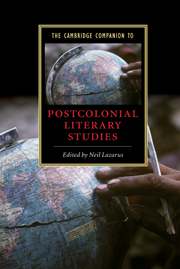Book contents
- Frontmatter
- 1 Introducing postcolonial studies
- Part 1 Social and Historical Context
- Part 2 The Shape of the Field
- Part 3 Sites of Engagement
- 10 Nationalism and postcolonial studies
- 11 Feminism in/and postcolonialism
- 12 Latin American postcolonial studies and global decolonization
- 13 Migrancy, hybridity, and postcolonial literary studies
- References
- Index
- Series List
12 - Latin American postcolonial studies and global decolonization
from Part 3 - Sites of Engagement
Published online by Cambridge University Press: 28 August 2006
- Frontmatter
- 1 Introducing postcolonial studies
- Part 1 Social and Historical Context
- Part 2 The Shape of the Field
- Part 3 Sites of Engagement
- 10 Nationalism and postcolonial studies
- 11 Feminism in/and postcolonialism
- 12 Latin American postcolonial studies and global decolonization
- 13 Migrancy, hybridity, and postcolonial literary studies
- References
- Index
- Series List
Summary
Given the curiously rapid rise to prominence of “postcolonial studies” as an academic field in Western metropolitan centers since the late 1980s, it is to be expected that its further development would involve efforts, like this one, to take stock of its regional expressions. Yet, while the rubric “Latin American postcolonial studies” suggests the existence of a regional body of knowledge under that name, in reality it points to a problem: there is no corpus of work on Latin America commonly recognized as “postcolonial.” This problem is magnified by the multiple and often diverging meanings attributed to the signifier “postcolonial,” by the heterogeneity of nations and peoples encompassed by the problematical term “Latin America,” by the thoughtful critiques that have questioned the relevance of postcolonial studies for Latin America, and by the diversity and richness of reflections on Latin America's colonial and postcolonial history, many of which, like most nations in this region, long predate the field of postcolonial studies as it was developed in the 1980s. How then to identify and examine a body of work that in reality does not appear to exist? How to define it without arbitrarily inventing or confining it? How to treat it as “postcolonial” without framing it in terms of the existing postcolonial canon and thus inevitably colonizing it?
- Type
- Chapter
- Information
- The Cambridge Companion to Postcolonial Literary Studies , pp. 221 - 240Publisher: Cambridge University PressPrint publication year: 2004
- 29
- Cited by



